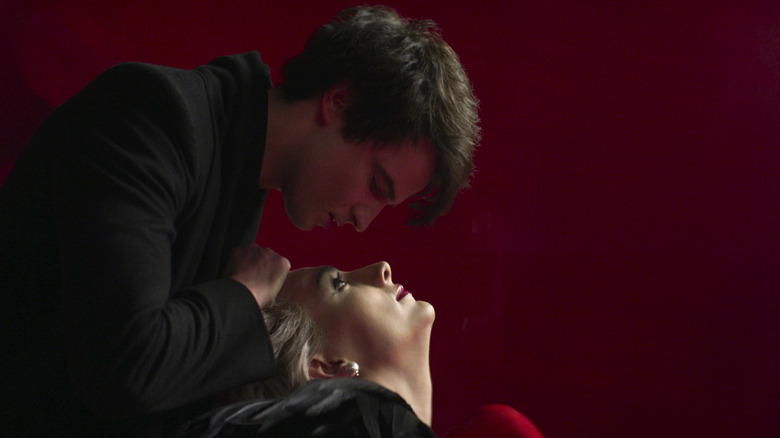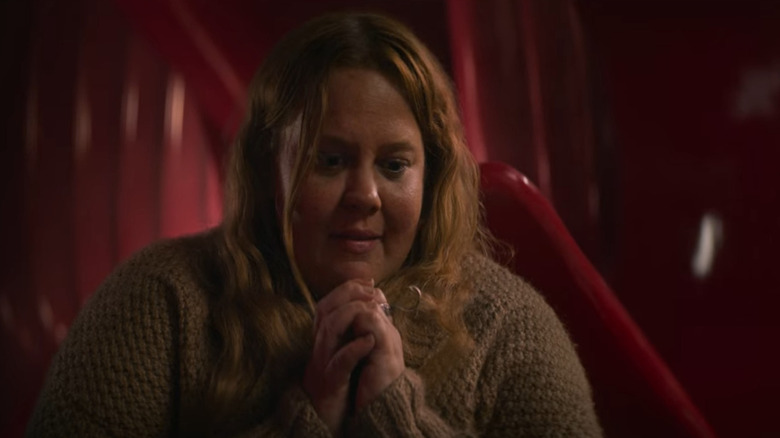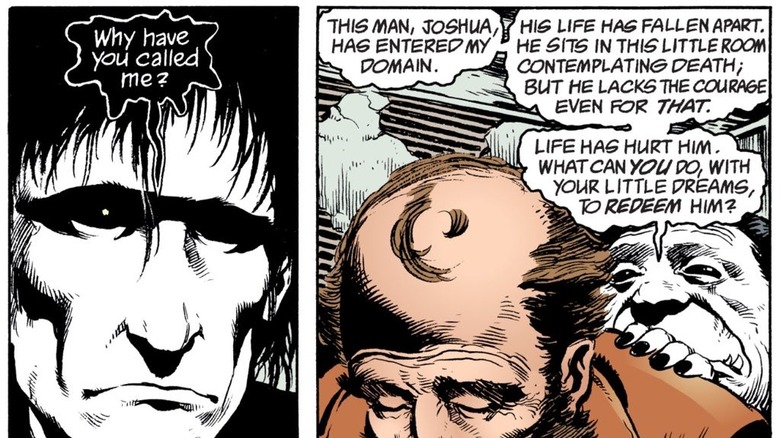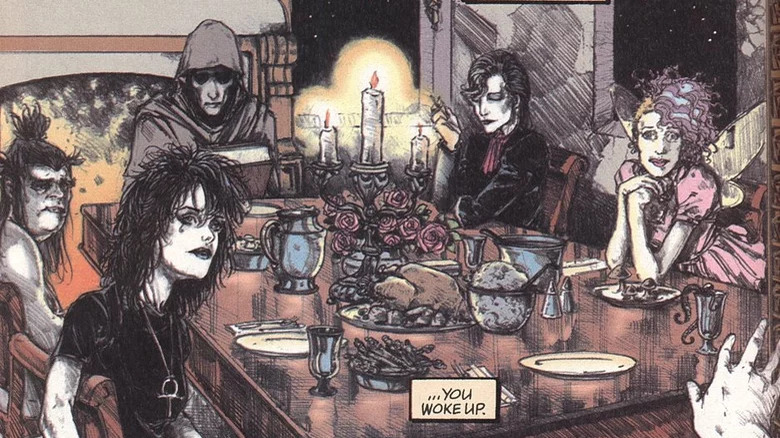Desire And Despair: What You Can Expect To See Of Dream's Troublesome Siblings In The Sandman
This post contains spoilers for the "Sandman" comics.
The first season of "The Sandman" has introduced us to more than half of the Endless, the seven siblings who serve as living embodiments of core human concepts. The series focuses on Dream (Tom Sturridge), a man who's personality is shaped by the dreams humans have, and who in return holds the power to shape human dreams. Dream's older sister Death (Kirby Howell-Baptiste) receives her own spotlight episode six episodes in with "The Sound of Her Wings," in which we see her go about her daily job. She's not the one who kills you, but she's the one who shows up when you die and gently guides you to whatever comes next.
All the Endless siblings have names that start with "D" for some reason. Not yet introduced is Destiny (the oldest), Delirium (the youngest), and Destruction (the forgotten middle child). The other two siblings are Desire (Alexander Mason Park) and Despair (Donna Preston), who are twins tied for second youngest in the family. The two haven't had a ton of screen-time so far, but they've definitely made an impression. Park portrays Desire as appropriately mischievous and seductive, and Preston nails her role as the depressed, masochistic Despair.
More than anything else, these are two characters who evoke a lot of questions. Why does Desire seem to hate Dream so much? Why are they the only twins in the family? What exactly is the point of them? These twins will continue playing an important role in the series, so let's take a moment to unpack their whole deal.
Desire: A creature of the moment
"Desire has never been satisfied with just one sex, or just one of anything," the narration reads in their official introduction in volume 2. Desire can switch back and forth between male or female, often settling somewhere in between. Desire is able to make humans want things, but is also beholden to the human idea of desire itself. As a result, their actions are often driven by pure emotion, leading them to make decisions that probably aren't wise in the grand scheme of things, even considering their own self interest.
This is made clear in season 1, which ends with the reveal that Desire was the one who impregnated Unity Kinkaid (Sandra James-Young) while she was in a coma. Desire does this knowing that Unity is supposed to be a dream vortex, meaning that when Dream is finally released from captivity, one of Unity's offspring will end up becoming the vortex instead. Because Dream has no choice but to kill vortexes for the safety of the universe, Desire will be forcing Dream to unknowingly kill a family member.
The show doesn't touch on this plot point much so far, but Dream killing a family member would be a huge deal. It would allow the Kindly Ones — the trio of women who've shown up in the episodes "Imperfect Hosts," "24 Hours," and "The Doll's House" — full authority to "hound him to the grave," as they themselves put it in the ninth volume. The Kindly Ones are an old, powerful force that Dream would have a hard time defending himself from, and if Desire's plan this season had been pulled off, Dream would've been in real mortal trouble. But will Desire actually be happy with Dream killed? It doesn't seem like they've thought that far ahead.
Despair
Despair in the comics is personified as a naked, heavyset woman with messy hair. She's pale and clammy looking, like a living corpse. The TV show changes her appearance to go for more of a "sad cat lady" vibe, with her wearing a sad-looking sweater. One feature the show kept was Despair's hooked ring, which she uses to carve into her own skin whenever she's feeling any strong emotion.
We don't know much about Despair's early history, except for the fact that about 100,000 years ago, she was killed and then reborn as a slightly different version of Despair. (Because the concepts the Endless embody still exist, they're always soon replaced by another version of themselves.) Beyond that, Despair's personality is pretty constant: she delights in human suffering. We see this in "Brief Lives," where she's introduced watching a man contemplate suicide. "Isn't it beautiful?" she asks Delirium at the sight of him.
Despite this, Despair tends to be pretty nice to her siblings, comparatively speaking. She has a particularly sweet relationship with her older brother Destruction, as we see in volume 7's "Brief Lives," where a flashback ends with Destruction giving her a friendly kiss on the cheek goodbye. "No one ever kissed Despair, save her brother," the narration reads. When Delirium asks Despair to help her find their missing brother Destruction, she says no, but we can tell she regrets turning Delirium down.
Despair is closest to her twin Desire, whom she tends to tiptoe around. The reason she rejects Delirium's request is because she's afraid of making Desire angry. The two may have been born around the same time, but Desire definitely seems to be one in charge. Despair is severely depressed throughout the series, so it makes sense that she plays a more passive role.
Their history with Dream
Because Desire doesn't think things through that much, their big season 1 plan fails, and their relationship with Dream only grows worse. Dream's relationship with Despair, however, stays pretty consistent. They rarely interact, but there doesn't seem to be nearly as much antagonism between the two. The only real time we see them fight is in the volume six short story, "Three Septembers and a January." There, Despair is in the middle of claiming the soul of Joshua, a man in 19th century America whose life had fallen apart. Despair challenges Dream to try to take Joshua away from her, asserting that his "little dreams" are no match for her. In the end, Dream wins the bet, but Despair doesn't seem to hold any grudge over her loss.
In the same story, however, we also see Desire attempt to claim Joshua, offering him money and attractive women in a sort of deal with the devil. Joshua refuses, and Dream basically gloats a little to Desire about their loss, calling their schemes unsubtle. After Dream leaves, we see an angry Desire saying, "He wants subtle? He'll get subtle. Just watch me... I'll make him spill family blood. I'll bring the Kindly Ones down on his blasted head..." It's a moment that makes it clear that despite Desire's relative short-sightedness, their plan to take down Dream has not been merely a short-term urge. Desire's been wanting to kill him for a long time, and they're not going to stop just because the Vortex plan failed.
The evolution of the Endless
Throughout the series, the Endless often feel like static characters, which makes sense. They are mostly immortal, after all, and they serve as the embodiment of human concepts; a single year won't change them the way it could change a human.
Despite that, the Endless do change. They just change very slowly, over the course of tens of thousands of years. This is shown most clearly in the collection "Endless Nights," which features the story, "The Heart of a Star." The issue is set billions of years before the rest of the series, back when Desire and Dream got along. Not only were they on good terms, but Desire used to be Dream's favorite sibling. But then Desire influences one of Dream's first girlfriends to fall in love with someone else, and so begins a multi-billion year sibling rivalry.
If they've changed over the billions of years since "Endless Nights," it's only been for the worst. Despair still feeds on human suffering and Desire is still selfish and short-sighted. Unchecked desire often leads to despair, after all, so each twin's flaws seem to feed into the other's, and that doesn't seem to be changing anytime soon.
But "The Sandman" comics are all about the illusion of permanence. Even if you're an immortal being with an eternity of experiences, you don't have to stay the same forever. We've seen through Dream's once-a-century meetings with Hob Gadling (Ferdinand Kingsley) that he's certainly grown a little kinder over the past six hundred years, even if he doesn't want to admit it. Perhaps Desire and Despair can change for the better too.




